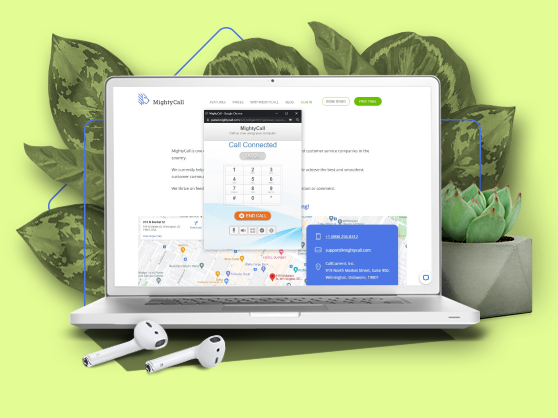So much theory has been written on “transforming the customer experience” that it has almost shifted into the realm of philosophy. Theory alone has never solved real-life business issues. In light of constant and pressing competition, eliciting anything less than a “wow” feeling from your customers will always put you behind a competitor.
To avoid this, you need a hands-on approach. Make no mistake: it’s not about finding magic sales and marketing tools. As helpful as these can be, your priority is an insider’s (not a generic) view of the fundamentals – an augmented reality you need to constantly exist in to make customers happy.
Whatever industry your business is a part of, here’s a simple strategy to turn classic “customer experience” theories into an updated practical approach sure to impress your clients.
Theory: Do what you say you do
KPMG studies show that customers are merciless at penalizing businesses that underdeliver. If you’re not fulfilling what’s expected of you in customer service or your products don’t match customer expectation, they aren’t going to stick around. Figures show that 89% of customers start doing business with a competitor after a poor experience.
You may think that you’ll simply find new customers to replace the old ones, but the same stats show that the expenses of bringing in a new customer are up to 10x greater when compared to retaining a current one.
Practice: Overdeliver whenever possible
Overdelivering is just another word for anticipating customer needs. While building a solid foundation implies doing your job well (and is the first step to boosting the customer experience), building up the structure of your business means outperforming your competitors.
Unfortunately, too many business owners stop at the initial “foundation” stage and thus never get past the competition. Their customers are always merely “content” with the product or service. However, content customers are unreliable and great customer experience is measured by the number of enthusiastic ones.
- Outperform your own ads:
whatever your customers read about your product or service, it’s the real thing that has to make them say “wow”.
Take a piece of paper and start noting down 10 new features that would positively surprise you about your own product. Then, pick out the top 3 and bring them to life.
Theory: Encourage customer feedback to showcase positive reviews
Encouraging customer feedback is a really important part of business growth. Positive customer feedback can be great for featuring on your website to show the real-life experiences behind your product. Moreover, it’s a terrific motivation for your team to continue working well. But if you always focus on the good stuff, you’ll never grow enough to fix your company’s weaknesses.
Practice: Learn from unhappy customers and showcase your improvements
As Bill Gates famously said, “Your most unhappy customers are your greatest source of learning.”
Though you will not want to have that sort of customer feedback pinned to your testimonials page, you must understand that learning from relevant negative customer feedback and acting on it is an art in itself. If you need any further incentive, just think about it: boosting customer retention rates by just 5% will give you a 25% – 95% profits boost!
- Send out “improvements” newsletters:
Understandably, not every discontent customer will take the time to give customer feedback on the exact thing they disliked. But even if they never say a word to you, many might reconsider their decision if they receive a friendly newsletter with your latest product/customer service improvements. Not sure how to do this? Check out this terrific example.
- Don’t be a friend just in happy times:
Send a follow-up email to customers who’ve been away from you for a while. Don’t try to convince – just show them your updated product(s) and customer service. - Stay polite:
Be caring and make it a habit of sending thank-you letters to clients. But even if something goes wrong, don’t panic: 63% of customers say a negative experience wouldn’t stop them from returning if they receive an apology from the company.
Theory: Love your product and customers will love it in return
This one is a classic and sounds simple enough. Love what you do, and others will follow. But love is difficult enough in life – what is it supposed to mean in business? Does it entail overlooking the flaws of your beloved product and always seeing the bright side? Or is it more of a domineering relationship which will always leave your product a victim of your own discontent? Well, none of that, really. When you love something, you are proud of it and want to show it from as many sides as possible.
Practice: Surprise customers with innovative ways to use your product
It’s hard to imagine a stronger leader at this than IKEA. Think of the countless ways they showcase a single product, making it accessible to all styles, budgets, and age categories. That’s because we’re much more likely to buy when impressed by versatility. This means an investment is worthwhile and may resonate even with skeptics.
Just imagine how much you’ll boost customer experience and pleasantly “wow” clients when they discover a dozen unexpected, creative ways to use your product!
- Note 10 innovative ways your product can be used:
perhaps it’s a surprising way to use the product, a whole new setting for it, or a way both kids and adults can have fun with it.
Even if your “product” is real estate, you can show clients many bright ideas they’ll love implementing in the house of their dreams.
Theory: Reach far and wide to get customers involved with your product
The theory still works for businesses that offer general services and products. But even so, by applying a one-for-all sales strategy, you risk putting all your customers in the same basket and ignoring demographics and personal preferences. Meanwhile, customers today want to stand out and have their individuality recognized more than ever before. That’s why even major brands consider personalization a key factor in their marketing campaigns.
Practice: Speak the language of your target audience
Is your product a potential hit with families, single moms, or maybe…hardcore bikers? If so, just think how much you’ll miss out on if using a generic sales approach. To start performing your best, you need to not only understand your target audience but put yourself in their shoes.
Do your products apply to several consumer categories? Great! Do several targeted marketing campaigns and research the data for each. You’ll discover the several most loyal follower categories which you can start catering to specifically.
- Find your voice:
On your website, social networks, and in newsletters, try talking about your product using language your target audience can relate to. Be a bit bolder, more humorous, or speak up about real-life issues your customers may be facing.
The bottom line: focus on the human, personal side of your business, and you’ll naturally ace the art of customer experience.
Theory: Quality speaks for itself
Quality is the heart of any business, but keep in mind that lasting customer experience impressions start from the very first second someone interacts with your business. No matter how much quality work you (or your product) are willing to show later, you can’t afford to lose that very first “wow” moment with your customer. This means you must learn to concentrate on quality without letting appearances slack.
Practice: Don’t ignore the wrap, even with the best contents
We’re all children at heart. We love being surprised with fancy (or at least smart) packaging instead of something wrapped in cardboard and duct tape. This is especially (and literally) true of niche-market products so popular with internet shoppers. But this also matters for customer relationships.
- For physical products: (especially: custom-made, hand-made, etc.)
Always have special branded packaging to ship your products in. If you need inspiration, just look at how a company can ship something as standard as light bulbs. Now imagine your own grin while opening that wrap and try to emulate it for your customers.
- For everything else:
The package may not be physical, but it’s still there, in that first impression customers have when interacting with you and the service you’re offering them. Often that will be through your website.
Theory: Engage clients with multimedia features
Everyone loves a business website with lots of interactive information. But have you ever visited a site with a noisy video that starts playing whenever you visit the home page and sends the visitor on an express quest to the mute button? Or a page that loads so slowly you’ll never get to appreciate all its terrific visuals? Or a site that’s fine on desktop but can’t load properly on mobile devices? In the age of minimalism, make sure you keep all the tech features on your website working towards the common goal.
Practice: Know how to use digital transformation to your advantage
There are lots of ways you can improve the customer experience without overwhelming clients with a never-ending advertising campaign. For example, the same little video about your business can perform just the opposite job, with just one simple trick: put it on mute by default, so clients who aren’t interested won’t be bothered while others will be intrigued enough to hit the unmute button.
What other online features can guide clients through your website instead of scaring them away? Here are a few things.
Provide diverse communication options:
- Over a third of online customers expect to get help within 5 minutes. But the way each client contacts you will be different: from calling a toll-free number, to scheduling a callback via a web widget to messaging. Here’s the good news: all of these features and more are available in every MightyCall plan. Best of all, if your business goes from 2 employees to 2,000, you’ll still be completely covered by our powerful virtual phone system.
- Stay minimalist:
Minimalist design gives users a sense of transparent professionalism. Its popularity makes complete sense. According to the B2B Web Usability Report, the top info customers are looking for on a vendor homepage is: “products and services”, “contact information”, and the “about us” section. If you’re wondering, “pricing” was ranked last. - Optimize mobile UX:
If you haven’t updated your mobile UX in a while, your general customer experience may be greatly suffering. Companies that focused on the mobile user experience typically notice up to a 64% sales increase.
After all’s been said and done, you must understand that the process of delivering the best customer experience is a constant battle to improve yourself, your brand, and your employees.
When you invest in making life easier for your customers, they won’t fail to appreciate your efforts and reward them with loyalty, and that’s sure to not only transform your business, but gift you with plenty of memorable moments in return!

 How to Wow Your Customers: From Theory to Practice"/>
How to Wow Your Customers: From Theory to Practice"/> 








